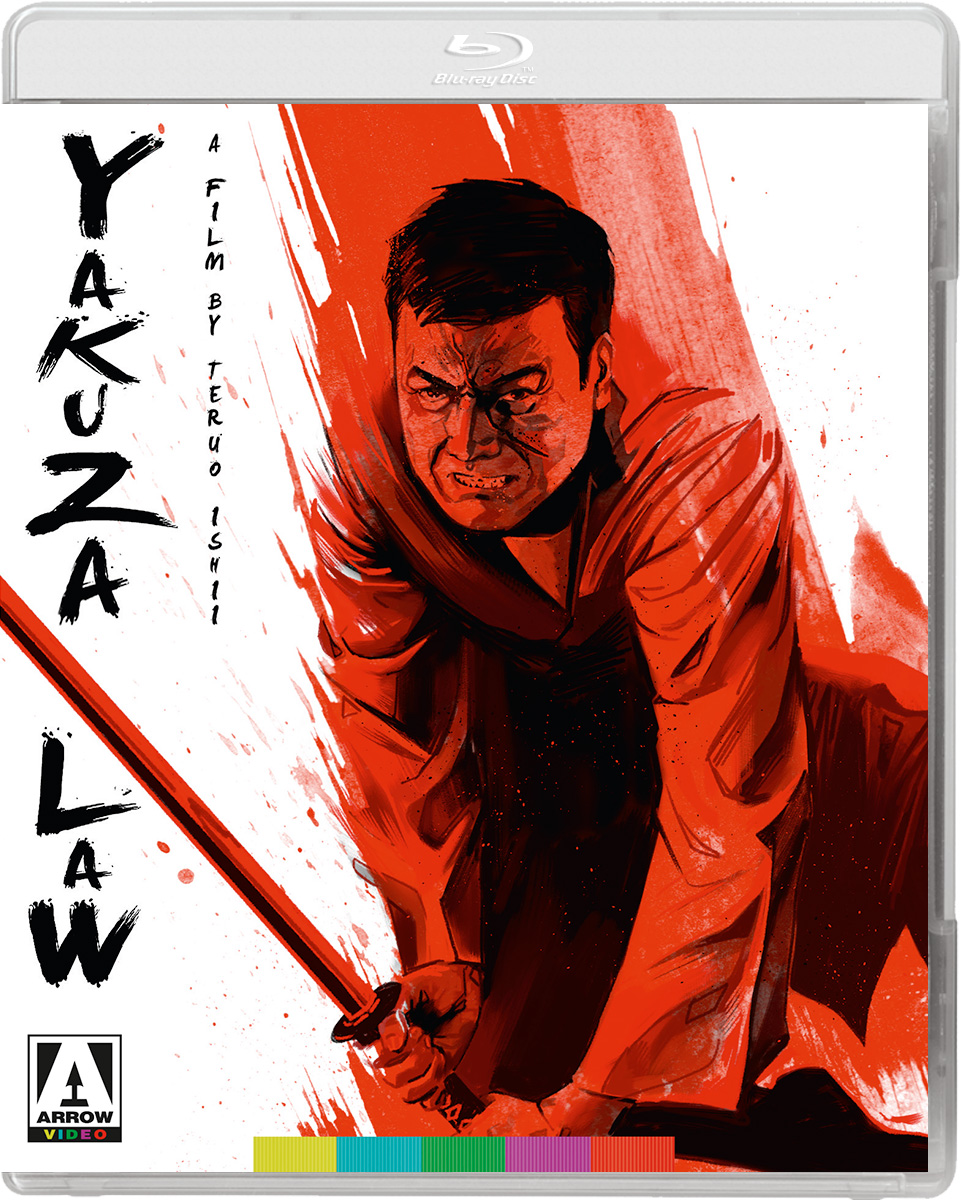
Yakuza Law
directed by Teruo Ishii
starring Bunta Sugawara, Minoru Oki, Teruo Yoshida
Arrow Video
Japanese director Teruo Ishii released six films for Toei Studios in 1969. It is a great testament to his talent that he could make movies basically non-stop, with minimal budgets and have films that have a voice that still resonates 50 years later. Despite the lurid subject matter of Ishii’s films of this period, they are all beautifully staged and shot, well beyond the expectation of their exploitation roots.
Yakuza Law aka Yakuza Law: Lynching is a hyper-violent splatter gore anthology encompassing three time periods; Edo (1603-1868), Taisho (1912-1926) and Showo eras. The trio of vignettes comprise an anti-morality tale, each illustrating a precept of the Yakuza code. Despite the generic title the torture, violence, and gore are the main attraction. The main title sequence features an entire film’s worth of blood and death including a man crushed in a backhoe, a man roasted alive on a spit, a forehead branding, and a power drill through the head.
The first Yakuza law illustrated is “One should not steal, and one should not have affairs with married women” Tomozo manages to violate both sections of this law and incur the righteous wrath of the family boss. Tomozo and his allies are subjected gruesome retribution including severed ears, a tongue torn out, and eyeball gouging.
The second segment sent around 1920 takes on the law “Those who cause trouble for the boss and the family will be expelled. Those who return will be punished.” This tale concerns a yakuza member returning home after three years in prison, in violation of the law, This segment is the shortest in the film and oddly is the least gory and exploitative and is pretty much a classic yakuza code tale and doesn’t quite fit with the rest of Ishii’s film.
The third tale “Those who destroy the family organization, and those leaking secrets for whatever reason, will be eliminated” moves into the late ’60s and replaces swords with guns and brings a swinging jazz score along for good measure. The thirty minute mini film is just bonkers. Gory deaths are only interrupted by car chases, gun battles, and explosions as rivial gangs do battle with each other in the search for some gold, but really it isn’t the plot that matters. The violence and gore is the star and the historical segments were to set the context for the supposed honor of the Yakuza. One memorable set piece of the final section is a gangster is treated to a “circus act” where his has a rope tied around his chest and is thrown out of a helicopter and is keel hauled along the beach . Other delights include a man having his hair and face set on fire by Zippos – not to get all Joe Bob Briggs but you also have death by car and gas station explosion, death by car crusher, and death by cement truck as well as good old fashioned shootings. In the end the gold is recovered and the mobsters turn on each other for the gold rendering greed as the only true law of the outlaw.
Despite the iffy middle section and the difficulty keeping up with the sheer number of characters and their loyalties in such short films, Yakuza Law still manages to be quite entertaining and even slips into the sublime in the insane finale.
Arrow’s Blu-ray presents a new HD transfer in Japanese and while it isn’t as amazing to look at as Blind Woman’s Curse or Orgies of Edo it is still quite nice. The disc includes an archival interview with director Ishii and an audio commentary from Japser Sharp. Sharp’s commentary is quite informative, but revels a bit too much in facts and stats about the players and less about the meaning of the film. He does however point out the uniqueness of Yakuza Law being a torture film where the violence is perpetrated against men instead of the typical torture and murder of female characters. The other main extra on this release is Erotic-Grotesque and Genre Hopping: Teruo Ishii Speaks, a newly edited archival interview with director Teruo Ishii. Arrow’s recent run of Ishii releases are an amazing testament to the glory of films that exist outside of the realm of the western world and deserve to be seen and celebrated.












